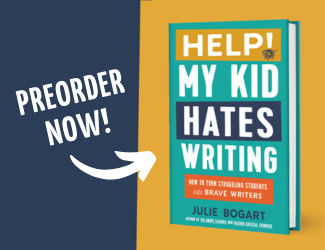Emerging Writers in the Rhetoric Phase
Brave Writer mom, Cindy, writes:
Hi Julie,
We’ve been using Brave Writer in our house for about a year now. My oldest (now entering 9th grade) took two of your courses last year, one working independently with Christine Gable, and I was floored by his maturity and growth in just a short time, and after having been so resistant to expressing himself through writing for so many years. We are attempting to switch to year round schooling this summer. Been a big shock for all of us! My son, was asked to read Around the World in 80 Days for social studies — like a geography lesson through fiction. Part of the suggested curriculum was a travel log, discussing what countries and cultures were visited and then looking up more information on those places. About halfway into the book, I received this unsolicited free write from Andrew:
Now, I know I should be doing travel logs for this book that I’m reading…
But it doesn’t give me time to think about the places I read about. It throws all this nonsense at me about how the gardens are lush with roses and papayas and whatever, and it doesn’t let me think about the place just described. The book could tell me that people living there have mushrooms growing out of their butts, but it would mash it together with some other information, so that I wouldn’t really notice, unless I dig into the book again to find that 1 fact. Let me put it this way, if your piece of gum runs out of flavor, you spit it out, right? This is a book where you shove ALL of the gum from that pack into your mouth at once, creating an enormous ball of information that you can barely analyze. Chewing this wad of gum is nearly impossible, and digging back through that ball of gum in order to find the one piece that was a different flavor is extremely time consuming, and difficult. It’s not that I don’t want to do these logs, because I would do them for most other books. But trying to do this for “Around the World in 80 Days”, is a time dump, that is unnecessarily hard.
Sorry if this sounds like another one of my famous rants to you, but it’s just my opinion on the matter. The book is confusing me with a pestilence of information, that I can’t really swat in order to put into my brain. It’s just all buzzing around my head annoying me.
For the first time, I got a glimpse of the writer he could one day be, of the one he is becoming, as his mind starts to work in abstractions. Just for that gum metaphor alone, I told him, just read the book, forget the log! I wanted to share because I think these subtle changes are coming from his experiences with free writing and your classes. I can’t wait to see what he can accomplish this year!
Cindy
Cindy, what a delightful sample of the emerging rhetorical thinker your son is becoming! The early to mid-teens are when the brain takes a big leap forward in cognitive power. By 25, the prefrontal cortex will have completed its development, but in the interim, the brain is slowly developing new wiring. The complexity of that neurological growth leads to a variety of brand new thinking skills! One of those is the capacity for imagining multiple perspectives simultaneously, as well as the enhanced ability to articulate one’s own posture (while challenging someone else’s).
Remember when your child was younger and he would simply assume if assigned a lesson, the lesson must be completed. When a child read a book, the author was considered to be an authority, an expert. Children may have personal preferences that they articulate prior to the teen years, but they are not as likely to question the fundamental authority with which adults express their opinions. They may not like what the authority intends, but they don’t question its right to assert power.
By the teen years, then, emerging adults begin to question the source of authority of any given speaker or writer. They wonder on what basis that point of view is valid. They recognize that even their much loved parents are not always operating from dispassionate clarity, but from personal bias or inadequate experience.
Andrew is challenging two authorities in this scenario. First, he is questioning the lesson (lesson-maker). He is not just saying, “I don’t want to do this assignment” like a child might. He’s analyzing the reasonableness of the assignment. He is using his own analysis of the contents of the book to bolster his reaction to the way the lesson-maker wrote the assignment. He even goes further to say that he’d happily complete logs for any number of books (proving that it is not childish will or lethargy that drives him), but this one novel, this specific book is not conducive to that assignment as constructed.
Second, Andrew is challenging you—your authority to require him to do an assignment he finds unreasonable. He is asking you to hear the reasonableness of his argument and to overturn your good judgment by honoring his! What’s wonderful is that you see all this amazing mind-growth, and are in awe of him, rather than put off by his unwillingness to complete the logs.
Too often we get side-tracked by content and miss the amazing development happening in front of our eyes. If I could say one thing to parents of teens (and to a younger version of myself), it’s this: “Notice what the argumentativeness or inquisitiveness means about teen brain growth in your child. Ignore your reaction to the content.”
So when your teen tells you that it’s reasonable to stay up all night for the third night running playing video games, listen to the construction of the argument. Listen to the way he appeals to you. Is he providing reasons? Is he considering the possible reasons you might say ‘no’? Is he exploring the possible repercussions to his own health to reassure you? Is he finding his own sources of authority to back his argument (even if those sources at first glance seem unduly biased or insufficient from your point of view)?
If he’s doing these things, you can be thrilled for his brain development no matter how much you worry about his getting too little sleep. Start with the brain. Start with enthusiasm for this new burst of argumentative challenge—where what you say doesn’t automatically go. This is how you grow critical thinkers. Your kids’ thoughts may be revised 100 times in the next 5-10 years. But it’s the fact of that revising process that you want to celebrate and foster. And notice!
Well done Cindy! You’ve given us a great example of the teen brain in full flower!



















Very interesting subject , appreciate it for posting . All human beings should try to learn before they die what they are running from, and to, and why. by James Thurber. kfackkdaedag